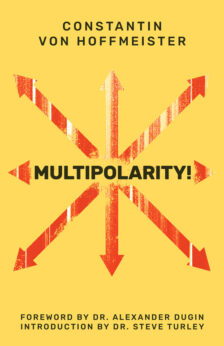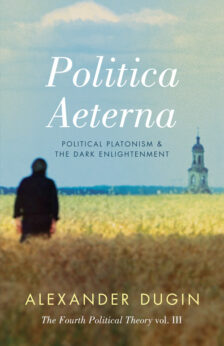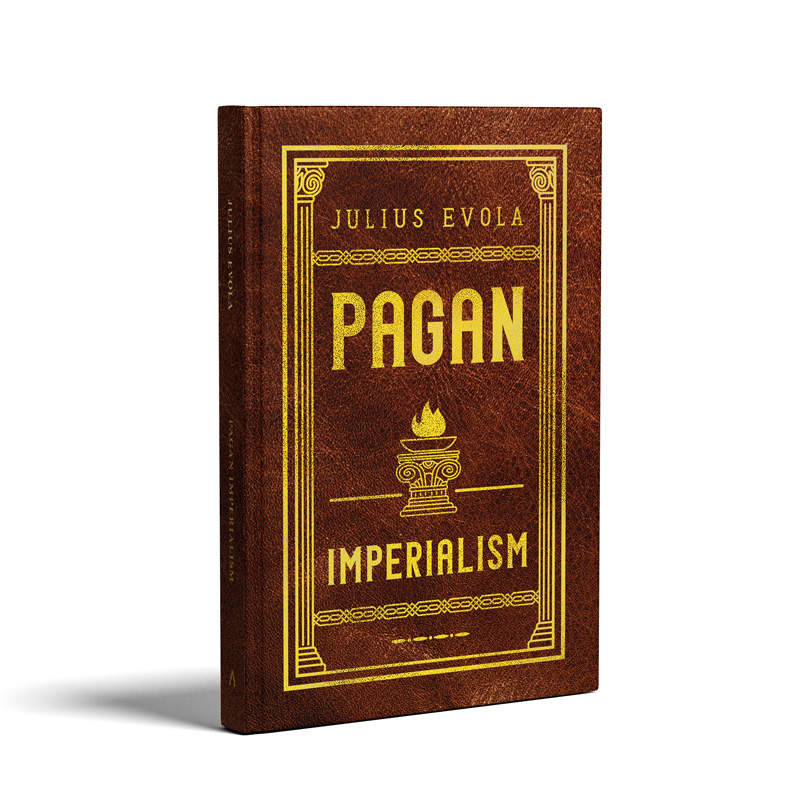Description
“In the 20th century, now, and in the forever future, we are unlikely to find a better spiritual guide than the immortal Baron of Sicily.” — James Kirkpatrick
In Pagan Imperialism, Julius Evola presents a fiery critique of the modern world, tracing the decay of Western civilization to its abandonment of its primal pagan roots. Evola condemns the rise of materialism, democracy, and equality, seeing them as signs of European man gone astray. He mourns the loss of the ancient spiritual hierarchy, where gods and warriors reigned supreme, and the cosmos pulsed with mystical energy.
Evola views Christianity as a weakening force that has replaced the proud, heroic spirit of paganism with submission and servitude to an alien deity. He envisions a revival of an empire built on the blood and fire of ancient rites, where the ruler embodies divine authority and the sacred order is restored. Pagan Imperialism is a provocative manifesto for those who dream of a return to a world rooted in the fierce, esoteric traditions of the past.
This new edition of Pagan Imperialism is a brand new translation by Heinrich Matterhorn, combining the original 1928 edition with the 1933 German edition. It also includes Evola’s extensive appendix. This edition is significantly longer than previous English translations and is enriched with detailed footnotes that provide definitions as well as commentary on different concepts and ideas mentioned in the text.
Do you live in Europe? Order this edition instead.
If you missed the presales of our previous limited editions, hurry — only a few copies of each title are left and they’re going fast. Get yours now:
The Fourth Political Theory by Alexander Dugin (limited leather-bound edition)
Table of Contents
- Foreword by James Kirkpatrick
- Introduction by Dmitry Moiseev
- Editor’s Note: The Rebirth of Pagan Imperialism
- Publisher’s Foreword to the First Edition (1928)
- Publisher’s Foreword to the German Edition (1933)
I. We, the Anti-Europeans
- The Decline of Europe
- The New Symbol
- The Primordial Nordic-Solar Tradition
- We Pagan Imperialists
- Fascism as Anti-Europe
- Protestantism and Romanity
- Mediterranean Tradition vs. Christian Tradition
II. The Conditions for Empire
- The Decline of the Imperial Idea
- Will to Hierarchy
- Catholicism and Romanity: Fascism at a Crossroad
- Protestant Deviation and Our Counter-Reformation
- The True Counter-Reformation
- Catholic Mystifications: A Warning
III. The Democratic Error
- True Liberalism
- Hierarchy According to Power: The Conquest of the State
- The Impossibility of Democratic Self-Government
- Anti-Hegelianism
- Anti-Mazzinianism
- The Individual and Humanity
- Totemism
- The Irrationality of Equality
- From Clan to Empire: Our Doctrine of Race
IV. The Roots of European Evil
- Gold: Returning to the Castes
- Science vs. Wisdom
- “Those Who Know” and “Those Who Believe”
- Mechanical Force and Individual Power
- Faustian Activism and the “Human World”
V. Pagan Values and Christian Values
- Christianity as Profane Intolerance
- Christianity as Pessimism and Immoralism
- The “Impurity” of Christian Practice
- Jesus Is Not the Type of a God
- Nietzsche, the Misunderstood
- The True Pan-Europe
- The Myth of the Two Eagles
- Ghibelline Restoration
- Foundational Perspective
- Fascism against Christianity: The Great Liberation
VI. Polemical Appendix on Guelph Attacks against Pagan Imperialism
- We Are Not Theosophists and We Are Not Freemasons
- Our “Orthodoxy”
- Confirmation of the Incompatibility between Romanity and Christianity
- Even the Catholic Tradition Cannot Be Equated with the Roman Tradition
Index












Reviews
There are no reviews yet